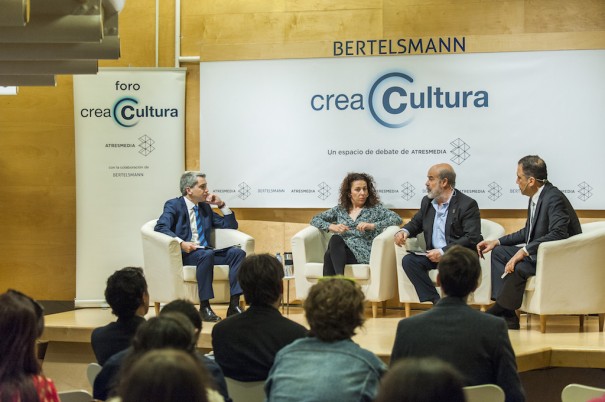El 90% de las producciones cinematográficas son pirateadas
Crea Cultura, la iniciativa de Atresmedia en defensa de la propiedad intelectual, organiza un debate sobre la piratería en el cine y cómo proteger una industria cultural amenazada.
Atresmedia, en colaboración con Bertelsmann y a través de Crea Cultura, su iniciativa para poner en valor la propiedad intelectual, organizó este jueves en Madrid su VIII Foro titulado La piratería en el cine: cómo proteger una industria cultural amenazada.
En el debate, moderado por el periodista Vicente Vallés, han participado la productora Sandra Hermida, el actor y también productor Antonio Resines, y el director general de Zeta Audiovisual y presidente de la Asociación Estatal de Cine, Paco Ramos.
Vicente Vallés ha iniciado el debate preguntando a los ponentes cómo está afectando a su trabajo el problema de la piratería. “La expectativa de unos ingresos reducidos nos puede llevar a la disminución de la calidad. Si el empresario, que es productor, y los que las financian tienen la percepción de que el ingreso será menor… podemos perder la ambición empresarial y la calidad”, asegura Paco Ramos.
Resines se suma a esta idea: “Si sabes que el producto es susceptible de robo, te piensas mucho invertir en él. Con los datos que tenemos, si invertimos un millón, igual no lo recuperamos. El porcentaje es brutal. Los ingresos de las películas en su mayoría vienen de los pases en las salas. Mientras no se controle la piratería, nunca vamos a saber cuánto dinero se deja de ingresar”.
Por su parte, Sandra Hermida hace hincapié en la educación: “Hay que dar valor a la cultura y entender que es la idiosincrasia de un pueblo. No hay conciencia de delito. Los padres lo hacen también”.
“El 90% de lo que se produce está pirateado”. Con este alarmante dato Antonio Resines continuaba su discurso afirmando no entender por qué el Estado no toma medidas: “Es gravísimo. Están dejando robar, impunemente, a todos los españoles. No solo a los autores. No les debe interesar. Nadie es capaz de decir públicamente que los que lo hagan son ladrones o cómplices, incluidos los consumidores”.
¿Cómo frenar la piratería?
“En EEUU si descargas te sale el logo del FBI y a la siguiente te cortan la conexión. En Alemania cortan directamente la conexión a la red. No hay ordenador ni móvil. Es lamentable, pero solo se dejan de hacer las cosas cuando te multan. A través de la educación se conseguirá dentro de varias generaciones, ahora hay que multar a la gente, como con el casco de la moto”, asegura Resines. Además, el actor y productor español continuaba trasladando su preocupación de que el Estado no haga nada: “Esto lo hablas con Montoro y te dice que tienes razón pero no hace nada. También el PSOE”.
En esta misma línea, Hermida afirma que “no se crean medidas para evitarlo porque sería muy impopular”. “No se toman medidas porque todos somos votantes. La cultura tiene que ser una cuestión de Estado. Esto es malo para todo el mundo. Nadie puede decir que no. Estamos defendiendo la cultura de este país. Es patrimonio de España y hay que defenderlo”, retoma Resines.
México y España son los países donde más se piratea. “En España somos expertos en decir: ¿Por qué yo? ¿Por qué voy a tener que pagar? Si no me van a pillar…”, comparte Ramos. En este sentido, Hermida cree que el peligro no es cometer el delito sino “que te pillen”.
Sobre el papel de las operadoras
Paco Ramos apuntaba que las operadoras vendieron “200 megas a los usuarios” lo que, a su juicio, permitía el consumo ilegal de contenidos. “Les están pirateando a ellos”, añadía Resines a la vez que afirmaba que “todas las series en este país están pirateadas. Las operadoras tendrán que plegarse al mandato del Estado, que es quien debe actuar”.
Vicente Vallés continuaba el debate preguntando qué tipo de películas son las que más sufren las consecuencias de la piratería. Todos los ponentes coinciden en que cuanto más comerciales son las películas, más sufren.
“La piratería es selectiva. Las películas menos comerciales son las menos pirateadas”, asegura Hermida a la vez que destaca que “la piratería afecta a producción independiente o productores. El resto de recursos económicos los has usado para hacer la película”, en un intento de alertar sobre el daño que hace consumir contenido de forma ilegal.
Paco Ramos añade que “en el fondo hacemos las películas por oficio y convicción. Si el tiempo que le dedicamos a las películas se las dedicásemos a otro negocio ganaríamos más dinero. Y los productores son promotores de las películas, son fundamentales”. Además, el presidente de la Asociación Estatal de Cine asegura que “cuando el Estado da una subvención es porque lo recupera”.
Consumo en salas y plataformas digitales
Para Sandra Hermida: “Cuesta menos ser de Netflix que ir a ver una película. La piratería de las series sí ha bajado con estas plataformas, por el acceso cómodo y legal en tu Smart TV”. Sin embargo, Paco Ramos alerta de que “el problema es que la gente deje de ir a las salas” porque, como continúa Hermida, “la gente piensa que tiene el mismo acceso desde su casa”.
“Sería maravilloso saber la recaudación en salas si no se produjese esta piratería. La entrada del cine se ha demostrado por activa y por pasiva que no es cara, es la más baja de Europa”, comenta Resines.
Ramos ha querido destacar el creciente consumo audiovisual en España: “Todos queremos seguir haciendo películas porque el español tiene ganas de consumir las películas. Cada año el consumo crece. Y en las parrillas de TV también crece el producto nacional. Casi todo es producción propia. ¿Por qué no nos ponemos a hacer más y mejor?”. Asimismo, el director de Zeta Audiovisual ha lanzado una propuesta: “Cuando una película pincha tras dos semanas en cines debería poderse lanzar online antes de las 16 semanas establecidas”.
¿Cómo sería la producción sin piratería?
Para Paco Ramos “habría alegría empresarial”, mientras que Resines afirma estar seguro de que “se invertiría más”. “Va de la mano con la calidad”, añade Sandra Hermida, “si nuestro cine fuera más rentable, el escenario financiero sería mejor”.
Ramos le pregunta al gobierno: “¿Queremos un país que tenga bares y turistas o que haga películas y series? Fuera de España, además de dos o tres cocineros o un atleta, los personajes con mayor proyección internacional pertenecen a la industria cinematográfica”.
El papel de las televisiones
“Las televisiones han visto que el cine es un buen negocio, que les da prestigio… Hoy son productores convencidos”, asegura Ramos.
Los contertulios coinciden en diferenciar la situación de las privadas de la pública ya que televisiones como Antena 3 se vuelcan más en la promoción de las películas. “Si coges las medias anuales de las películas y comparas en taquilla las de Antena 3 o Telecinco con las de TVE, estas son menores. Las campañas de promoción son más pequeñas”, asegura Hermida.
Ramos concluía poniendo el foco en el compromiso que debería tener TVE en busca de una producción cinematográfica con vocación de servicio público.
Did you like this article?
Subscribe to our NEWSLETTER and you won't miss anything.


















